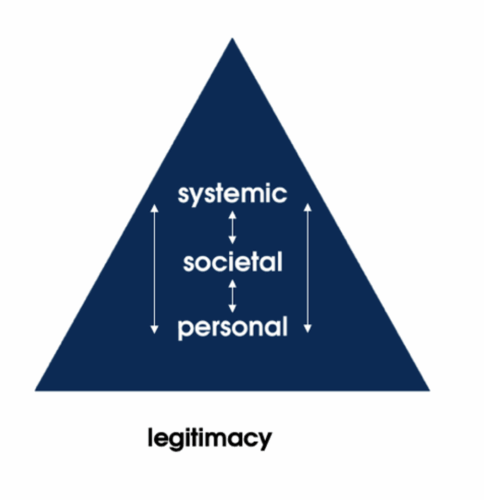Legitimacy
In societies fractured by normative complexity, political instability, and institutional distrust, legitimacy has become a scarce and intangible, yet essential resource

An organization is no longer judged solely on what it does, but on what it represents
· It must demonstrate not just economic or functional value, but also social, ethical, and symbolic relevance
· It must align with the normative expectations of its environment while preserving internal coherence
· It must navigate a landscape of paradoxes, such as performance vs. responsibility, innovation vs. compliance, autonomy vs. accountability, without losing sight of its purpose
Legitimacy is defined as the perception that an organization’s actions are appropriate, acceptable, or desirable within a socially constructed system of norms, values, and beliefs
Legitimacy is not the same as reputation
· Reputation is about image: it’s immediate, emotional, and shaped by current events.
· Legitimacy is the collective perception that an organization has the right to exist, to act, and to take up space, because it aligns with the values, expectations, and norms of its environment.
· The real issue is not what to say, but whether you have the right to speak. It’s not about visibility — it’s about acceptability.
· Legitimacy is what allows an organization to make decisions that people can respect, even if they don’t fully agree with them.
· It’s also what enables communication, PR, and public affairs strategies to truly hit the mark — at the right level, with the right resonance.
Legitimacy is an intangible asset, which can be:
earned
at creation or during strategic repositioning
accumulated
through consistency and perceived conformity
lost
following normative, ethical, affective, or functional breaches
recovered
via repositioning or narrative transformation strategies

Legitimacy concerns all organizations under public scrutiny — not only NGOs or public bodies, but also regulators, media, investors, citizens, and private entities.
It is especially critical in the following contexts:
· large public or semi-public institutions
· regulated sectors
· mission-driven companies and cultural institutions
· organizations facing controversy or public scrutiny
· economic actors operating in politically unstable environments
In such cases, the issue is not simply to perform, but to justify one’s existence.
To remain aligned with societal expectations.
And sometimes, to withstand external shocks or deep societal shifts.
Three dimensions of legitimacy

Legitimacy operates on three levels:
- Systemic (cognitive)
The organization is perceived as necessary, taken for granted. - Societal (moral)
Its practices are viewed as fair in light of collective norms. - Personal (pragmatic)
It delivers a direct benefit to its stakeholders.
Each dimension impacts the others and requires tailored legitimation strategies. They are not instantly resolved, they are managed over time, with strategic clarity.
Our approach
In a true peer-to-peer model, we support executives facing essential strategic questions:
· How to align the organization’s positioning to the context without losing direction?
· How to respond to contradictory institutional demands?
· What narrative ensures long-term continuity?
We draw on institutional theory, non-market strategy, paradox management, and practical experience in political, media, and cultural environments.
Legitimacy cannot be proclaimed, it must be built and sustained
